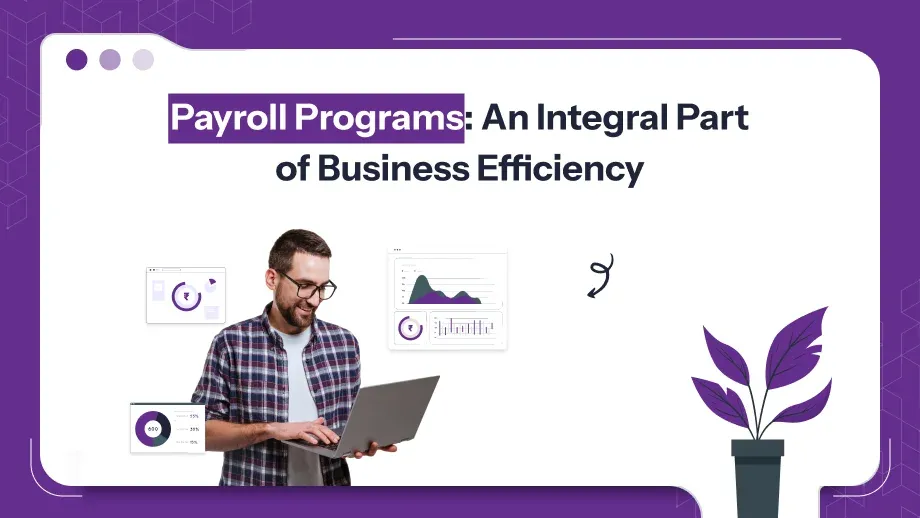
Generally, running payroll programs manually involves numerous errors and also delays or even some compliance issues that can horribly harm the running operations of any business. Risk elimination posed by such instances is highly achieved in the best payroll program as they involve an automated calculation process, deductions process, and even tax filing process.
Also, they ease some administrative burdens as the HR and finance teams may divert their attention on more strategic functions. These programs improve the overall efficiency and help businesses comply with the changing labor laws by integrating payroll with other business systems. Businesses can have smoother payroll processing, improved employee satisfaction, and reduced risk of costly mistakes with the right payroll software.
What is a Payroll Program?
Payroll software, frequently referred to as a payroll program, is an automated instrument used for handling payrolls for companies. Because it handles salary calculations, tax withholding, advantages, and compliance with regulations, it makes managing an organization’s pay easier. These can be as simple as small business solutions to the more advanced enterprise systems.
Key Features of Payroll Programs
Knowing the essential components that can help you streamline your procedures and ensure accuracy is crucial when selecting the right payroll tools for your company. These are some of the most prevalent and useful characteristics of pay software:
Automated Salary Calculations
Automated Salary Calculation Payroll software will calculate salaries on different pay structures, like an hourly or salaried worker or on commission. It will automatically add overtime, deductions, and bonuses into the calculations for an accurate salary every time.
Tax Filing and Compliance
Compliance and Tax Filing Payroll programs systems automatically calculate federal, state, and local tax expenses, ensuring that businesses stay in compliance with tax rules. For the purpose of lowering the possibility of fines for inaccurate submissions, the majority of her applications also generate and send tax records to the IRS, including W-2s or 1099s.
Direct Deposit and Payment Processing
Direct Deposit and Payment Processing Payroll programs for small business can be easily used to initiate direct deposit for employees, saving on paper checks and the extra work that comes with it. The payment process is safe and quick, and thus employees get their money in good time.
Employee Benefits Management
Employee Benefits Management. Many payroll software programs have also included the feature of employee benefits management such as health insurance, retirement plans, and PTO. Such a feature provides the employer the option to administer every aspect of an employee’s compensation in a single place.
Reporting and Analytics
Analytics and Reporting Real-time data regarding payroll expenses, taxes, and deductions is offered by payroll programs. These and other important variables will help with forecasting, budgeting, and maintaining accurate financial records.
Customizable Pay Schedules
Customizable Pay Schedules It does not matter whether you pay your employees on a weekly, bi-weekly, or monthly basis. You can customize pay schedules with payroll software. Proper amounts are paid out each cycle, and it is easy to make adjustments when necessary.
Types of Payroll Programs
The size, requirements, and extent of the company should all be taken into consideration when choosing a payroll program. There are many different kinds of payroll systems on the market, catering to both small businesses and major corporations. You can decide on the best choice for your company by being aware of their differences.
Basic Payroll Software
Basic payroll software is best suited for small businesses with uncomplicated payroll that doesn’t employ too many staff. Such applications are easy to use, cheap, and designed for simple payroll calculations, producing pay stubs, and performing tax deductions. The reporting feature may be available in a basic payroll application as well as some common deductions that may include retirement contributions, health insurance, or paid time off (PTO).
Cloud-Based Payroll Software
Due to their versatility, adaptability, and remote access, cloud-based payroll systems are growing increasingly popular. Because cloud-based payroll systems are hosted on the cloud, companies can use any device with an Internet connection to get to the system. More sophisticated functions like managing benefits for staff, keeping track of employee time, and connecting into additional corporate resources like accounting and human resources software are sometimes offered by online payroll programs.
Enterprise-Level Payroll Software
Enterprise-level for employee payroll programs is used by large organizations that have thousands of employees and require complex payroll solutions. These systems are highly customizable and can support advanced functions, such as multiple pay grades, diverse employee benefits packages, union dues, and multi-state or international payroll. They also often integrate with other enterprise systems, such as HRIS or ERP software, which provides a seamless experience across the various business operations.
Integrated HR and Payroll Software
Consolidated HR and payroll software will have payroll administration integrated with human resources functions such as recruitment, onboarding, employee benefits, performance management, and more. This will be particularly helpful to companies because they can integrate both payroll and HR activities and payroll programs under one umbrella where they will not need to use several software packages simultaneously. Most of the integrated systems will allow real-time seamless data transfer between payroll and other human resource elements such as attendance tracking and performance reviews.
Outsourced Payroll Services
Outsourced payroll services provided by third party payroll companies do all payroll-related work for an organization. Business owners should avail this option where they can relieve themselves of core operations and let the outsourced payroll service handle all functions from payroll preparation to tax, compliance, or even paying salaries to employees- hassle-free services for the entrepreneur.
Freelancer or Contractor Payroll Software
For companies working directly with freelancers or independent contractors, specialized payroll programs have been developed specifically for contractor payroll management. It’s designed to optimize and make the processing of payments to freelancers, deductions, 1099 forms generation, and keeping track of invoices. Freelance payroll programs aim to make more understandable the inherently complicated nature of non-employees whose pay structure may vary and also require different types of taxes.
A Comprehensive Guide to Payroll Programs for Small Businesses
Payroll management is a challenging endeavor for small business owners, especially when managing staff members, taxes, and labor regulations. But by simplifying payroll management, saving time, and reducing the possibility of error, a suitable payroll program can lessen this burden. The top payroll plans for small businesses are addressed in this article along with their key features and the impact they have.
Why Do Small Businesses Require Payroll Systems?
Payroll programs for a small business includes more than mere payment to workers. It would include wage computations, tax withholdings, unemployment insurance, other benefits, and reports. When all these aspects are done through manual processes, it becomes tiresome, with a higher propensity for errors. Moreover, for those who may not be accustomed to tax regulations or labor practices, it involves a risk.
Here are just a few of the reasons for payroll systems:
- Accuracy: Payroll software reduces error in calculation and tax withholdings and benefits.
- Time Saving: Automated payroll process in india programmes save time with the payroll preparation, and the time can then be devoted to other business undertakings.
- Compliance: Payroll applications ensure that all federal, state, and local tax laws are followed as well as labor law.
- Cost Effective: Many small business payroll options are cost effective and provide more value in relation to features as well as the scalability.
Advantages of Employee Payroll Programs
Programs for payroll for staff members are crucial resources for companies looking to efficiently and effectively handle payroll. These programs offer a number of advantages that can significantly improve the handling of payroll, lower human mistake rates, and ensure compliance with tax laws.
Cost Savings
Payroll software can save groups money over time, even when it has a purchase or subscription cost. Payroll software automation lowers payroll-related costs by eliminating the requirement for outside payroll providers or accountants. Payroll systems’ accuracy and efficiency can help lower the expenses related to payroll issues, like claims for reimbursement or the need for reprocessing payment.
Enhanced Employee Satisfaction
Better employee morale and payroll programs satisfaction result from consistency and reliability in payroll processing. Employees tend to be very appreciative about receiving their pay on time and without any errors.
It also means the employees get their check without any mistakes or delays using payroll software. Direct deposit capabilities and the facility to access a pay stub online further improve employee experience. Employees’ trust in and satisfaction with a smooth payroll process will naturally increase retention rates.
Faster Processing
Payroll programs can quickly process paychecks, which save time when employees are paid. Most payroll software allows payroll processing to be done within a few clicks, thus guaranteeing fast and effective payment of the employees. For companies with very large workforces or have to meet very strict payroll deadlines, this means an end to waiting periods associated with manual payroll computations.
Improved Record-Keeping
Every payroll cycle, involving compensation, tax deductions, payroll implementation, perks, and payments, is meticulously tracked by payroll programs. Businesses are certain to have current and precise data on hand when needed thanks to this systematic keeping of records. Digital records facilitate finding data and preserve a transparent audit trail, whether for filing taxes, the auditing process, or settling payroll issues.
Conclusion
Payroll programs for businesses may quickly and precisely manage employee wages, taxes, benefits, and compliance required with the help of payroll solutions. These programs are transformative for companies of all kinds, from lowering the chance of mistakes and conserving time to ensuring tax compliance and raising employee happiness. Companies can increase data security, streamline operations, and eventually concentrate more on expansion and strategic projects by automating payroll procedures. While selecting the best payroll application requires evaluating the particular needs and financial limitations of your company, the benefits greatly exceed the drawbacks.









